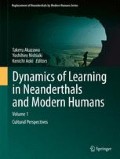Abstract
Many theoretical works using mathematical models or computer simulations have been performed. Although these studies have yielded some important achievements in theoretical aspects of evolution of learning strategies, they are described in mathematics and are not necessarily easily accessible to all empirical researchers. To facilitate more collaboration, here we verbally, without equations, review the simplest type of models of cultural evolution to acquaint empirical researchers with the common motivations of and questions asked by theoretical researchers in this field. Then we evaluate the assumptions of the simplest type of models in detail. This reviewing process might serve to make explicit the motivations or interests which have been considered as important by empirical researchers but never modeled by theoretical researchers.
Access this chapter
Tax calculation will be finalised at checkout
Purchases are for personal use only
References
Aoki K (2010) Evolution of the social-learner-explorer strategy in an environmentally heterogeneous two-island model. Evolution 64:2575–2586
Aoki K, Nakahashi N (2008) Evolution of learning in subdivided populations that occupy environmentally heterogeneous sites. Theor Popul Biol 74:356–368
Aoki K, Wakano JY, Lehmann L (2012) Evolutionarily stable learning schedules and cumulative culture in discrete generation models. Theor Popul Biol 81:300–330
Arbilly M, Motro U, Feldman MW, Lotem A (2010) Co-evolution of learning complexity and social foraging strategies. J Theor Biol 267:573–581
Biesmeijer JC, Seeley TD (2005) The use of waggle dance information by honey bees throughout their foraging careers. Behav Ecol Sociobiol 59:133–142
Borenstein E, Feldman MW, Aoki K (2008) Evolution of learning in fluctuating environments: when selection favors both social and exploratory individual learning. Evolution 62:586–602
Boyd R, Richerson PJ (1985) Culture and the evolutionary process. University of Chicago Press, Chicago
Enquist M, Eriksson K, Ghirlanda S (2007) Critical social learning: a solution to Rogers’ paradox of nonadaptive culture. Am Anthropol 109:727–734
Feldman MW, Cavalli-Sforza LL (1984) Cultural and biological evolutionary processes: gene-culture disequilibrium. Proc Natl Acad Sci U S A 81:604–607
Feldman MW, Aoki K, Kumm J (1996) Individual versus social learning: evolutionary analysis in a fluctuating environment. Anthropol Sci 104:209–232
Henrich J (2004) Demography and cultural evolution: how adaptive cultural processes can produce maladaptive losses–the Tasmanian case. Am Antiquity 69:197–214
Henrich J, Boyd R (1998) The evolution of conformist transmission and the emergence of between-group differences. Evol Hum Behav 19:215–241
Izquierdo LR, Izquierdo SS (2008) Dynamics of the Bush–Mosteller learning algorithm in 2 × 2 games. In: Weber C, Elshaw M, Mayer NM (eds) Reinforcement learning: theory and applications. Austria: I-Tech Education and Publishing, Vienna
Kameda T, Nakanishi D (2002) Cost-benefit analysis of social/cultural learning in a nonstationary uncertain environment: an evolutionary simulation and an experiment with human subjects. Evol Hum Behav 23:373–393
Kobayashi Y, Aoki K (2012) Innovativeness, population size, and cumulative cultural evolution. Theor Popul Biol 82:38–47
Kobayashi Y, Wakano JY (2012) Evolution of social versus individual learning in an infinite island model. Evolution 66:1624–1635
Lehmann L, Wakano JY (2013) The handaxe and the microscope: individual and social learning in a multidimensional model of adaptation. Evol Hum Behav 34:109–117
Lehmann L, Feldman MW, Kaeuffer R (2010) Cumulative cultural dynamics and the coevolution of cultural innovation and transmission: an ESS model for panmictic and structured populations. J Evol Biol 23:2356–2369
Lehmann L, Wakano JY, Aoki K (2013) On optimal learning schedules and the marginal value of cumulative cultural evolution. Evolution 67:1435–1445
Lumsden C, Wilson EO (1981) Genes, mind, and culture. Harvard University Press, Cambridge
Nakahashi W, Wakano JY, Henrich J (2012) Adaptive social learning strategies in temporally and spatially varying environments. Hum Nat 23:386–418
Rendell L, Fogarty L, Laland KN (2010) Rogers’ paradox recast and resolved: population structure and the evolution of social learning strategies. Evolution 64:534–548
Rogers AR (1988) Does biology constrain culture? Am Anthropol 90:819–831
Wakano JY, Aoki K (2006) A mixed strategy model for the emergence and intensification of social learning in a periodically changing natural environment. Theor Popul Biol 70:486–497
Wakano JY, Aoki K (2007) Do social learning and conformist bias coevolve? Henrich and Boyd revisited. Theor Popul Biol 72:504–512
Wakano JY, Kawasaki K, Shigesada N, Aoki K (2011) Coexistence of individual and social learners during range-expansion. Theor Popul Biol 80:132–140
Wakano JY, Miura C (2013) Trade-off between learning and exploitation: The Pareto-optimal versus evolutionarily stable learning schedule in cumulative cultural evolution. Theor Popul Biol, in press, doi: 10.1016/j.tpb.2013.09.004
Author information
Authors and Affiliations
Corresponding author
Editor information
Editors and Affiliations
Rights and permissions
Copyright information
© 2013 Springer Japan
About this chapter
Cite this chapter
Wakano, J.Y. (2013). A Perspective on Evolutionary Models of Learning Strategies. In: Akazawa, T., Nishiaki, Y., Aoki, K. (eds) Dynamics of Learning in Neanderthals and Modern Humans Volume 1. Replacement of Neanderthals by Modern Humans Series. Springer, Tokyo. https://doi.org/10.1007/978-4-431-54511-8_18
Download citation
DOI: https://doi.org/10.1007/978-4-431-54511-8_18
Published:
Publisher Name: Springer, Tokyo
Print ISBN: 978-4-431-54510-1
Online ISBN: 978-4-431-54511-8
eBook Packages: Humanities, Social Sciences and LawSocial Sciences (R0)

